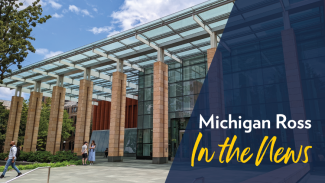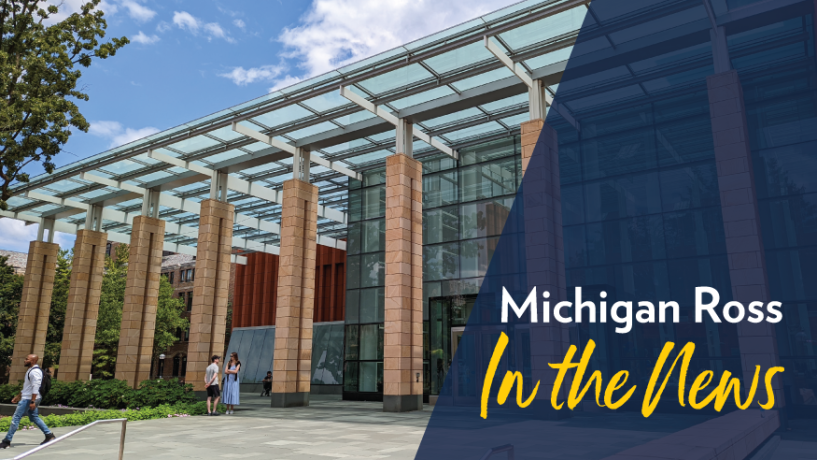Ross Featured In the News - Week of May 24

Week Ending May 24
May 24 - The Conversation - Colorado Takes A New - And Likely More Effective - Approach to the Housing Crisis (Brian Connolly)
Bolstered by my experience as a land-use lawyer, my research demonstrates some of the issues with well-intentioned single-family zoning reforms: It is too expensive and difficult to finance projects that add just one or two additional units to properties sporadically. What’s more, small projects like these don’t attract experienced developers.
Allowing higher-density housing, reducing development fees and speeding up permitting time frames will result in more homes being built more quickly, my research shows.
May 18 - Poets&Quants - 2024 Best 40-Under-40 MBA Professors (Jun Li)
What are you currently researching and what is the most significant discovery you’ve made from it?
Jun Li: “I am currently researching the childcare crisis that has challenged America for decades. I find over half of the population live (work) in childcare deserts, areas where there is no or extremely low childcare supply compared to the number of children who need care. I also find that there is a large variation when it comes to the quality of childcare centers. I further find lack of quality care impedes scientists’ career development and undermines gender equity in science. I am currently researching ways to fix the system.”
May 18 - Poets&Quants - 2024 Best 40-Under-40 MBA Professors (Andrew Wu)
In my opinion, companies and organizations today need to do a better job at…
Andrew Wu: “Improve the strategic preparation for the integration of AI and related technologies. This round of AI-driven transformation is accelerating faster than ever, and it is crucial for companies to prepare more comprehensively than before to ensure they are not left behind. Therefore, I think It’s imperative for businesses to develop a robust strategic framework that aligns their business models, roles, and performance indicators with the appropriate AI technologies, promote adaptability in the use of these technologies, and develop a framework in quantifying the impact of these technologies. Taking this approach will enable businesses to leverage AI effectively and maintain their competitive advantage.”
May 18 - The New York Times - A Loss at Mercedes-Benz Slows U.A.W.’s Southern Campaign (Erik Gordon)
The union has signaled that it expects to focus its organizing efforts on another Alabama plant — a Hyundai factory in Montgomery. But organizing that plant will probably be even harder than the campaign at the Mercedes factories, said Erik Gordon, a University of Michigan business professor who follows the auto industry.
The U.A.W. won’t have that kind of support at Hyundai’s Montgomery plant, Mr. Gordon said. “In general, Korean car companies have more adversarial relationships with unions than do the German manufacturers,” he said. “Korean companies are less used to sitting together in a conference room with unions.”
Week Ending May 17
May 16 - MarketPlace - How Do Voters Feel About the Biden Administration’s China Tariffs? (Erik Gordon)
Erik Gordon: “The Republicans, oddly, are in favor of [tariffs]. They think it’s more important to protect U.S. business jobs, even if it means that it’s more expensive to import certain goods. They think that’s more important than keeping prices low.”
“Democrats are not so gung-ho as the Republicans are. You know, 52% of Republicans are in favor of tariffs — only 41% of Democrats.”
May 16 - The New York Times - What the Supreme Court Ruling Means for Other Consumer Bureau Actions (Jeremy Kress)
Jeremy Kress, assistant professor of business law at the University of Michigan Ross School of Business, said comments like Ms. Johnson’s indicated that bank trade groups would press their concerns through administrative law channels. Government agencies must follow detailed rules when drafting regulations, and industry groups frequently accuse the consumer bureau of breaking them.
“Bank trade groups still have a lot more ammunition to bring this fight to the Fifth Circuit,” Mr. Kress said.
May 15 - The Independent - #Blockout2024: Why Followers are Blocking Global Celebrities and their Businesses on Social Media (Marcus Collins)
“The Met Gala was a bit of a hyperbolic moment that got a lot of people’s attention,” Marcus Collins, an assistant professor of marketing at the University of Michigan, told NPR.
“The celebrity boycotts had existed, but they weren’t really at the top of the social zeitgeist. But then you have a moment like the Met Gala that wasn’t really related to the conflict, but the pieces were all at play. When the attacks [in Gaza] were happening the same day, the juxtaposition just got people talking and moving.”
He continued: “The hope is that it will either bring more visibility to the cause and shift the balance in getting political forces like the US government to do something to mitigate the violence that’s happening in the Middle East. But as rational as that logic may seem, I don’t think there are very many examples where this has actually worked.”
May 13 - New York Post - Home Prices Come into Focus as Key Swing-State Issues in 2024 Election (Brian Connolly)
“Housing remains one of the few areas of bipartisan agreement, and poll results are consistent with what’s seen nationwide at the state and local levels,” says Brian Connolly, assistant professor at the University of Michigan’s Ross School of Business.
Week Ending May 10
May 1o - Financial Times - Lawrence Wong, Singapore’s Next PM Faces an Even Trickier Balancing Act (Linda Lim)
As co-chair of the Covid-19 task force, Wong was associated with Singapore’s efficient handling of the pandemic. “It paved the way for his visibility with everyday Singaporeans for the first time,” says Linda Lim, a professor emerita at the University of Michigan, who knew Wong when he studied economics there. Yet it was not the public that chose Wong. Lim claims he was selected because he was acceptable to the largest group of people within the PAP, rather than for being a visionary. “He is a piece of the puzzle, but the party is still everything in Singapore,” she says.
May 5 - Business Insider - AI Boom is Like Dot-Com Bubble With One Dangerous Difference (Erik Gordon)
The internet was revolutionary and AI will be too, Erik Gordon, a professor at the University of Michigan's Ross School of Business, told Business Insider.
"Both themes are right. But that doesn't mean companies with valuations based on those themes were or are good investments," he said. "Many dot-com companies that drove the internet change went broke doing it. Many AI companies driving as big a change will go broke or lose half their value."
May 4 - CNN - What Exactly Goes into Closing Costs? (Brian Connolly)
Brian Connolly, an assistant professor of business law at the University of Michigan, said it’s too soon to predict how the NAR settlement may affect closing costs.
“It’s not really all that clear what’s going to happen with broker commissions after the NAR settlement goes into effect this summer,” Connolly said, predicting the status quo may remain even after the settlement takes effect. “At least initially, we’re likely to see the percentage commission system continue.”
Week Ending May 3
April 29 - ClearanceJobs - The Impact of FTC Ban on Non-Compete Agreements (Norman Bishara)
“In the tech sector, in particular, where high-velocity labor markets and employee mobility and knowledge transfers are essential, non-competes have been a drag on innovation and new startups. The counter-example that is often cited is California’s ban that dates to the 1840s and may have facilitated the easy employee mobility that defines Silicon Valley’s success,” said Norman D. Bishara, professor of Business Law & Ethics at the University of Michigan’s Ross School of Business.
Bishara told ClearanceJobs that the ban on non-compete agreements should level the playing field between entrenched, large companies that benefit from restricting mobility and the newer and leaner startups where attracting new employees that learned from those other firms is a key driver of innovation.








